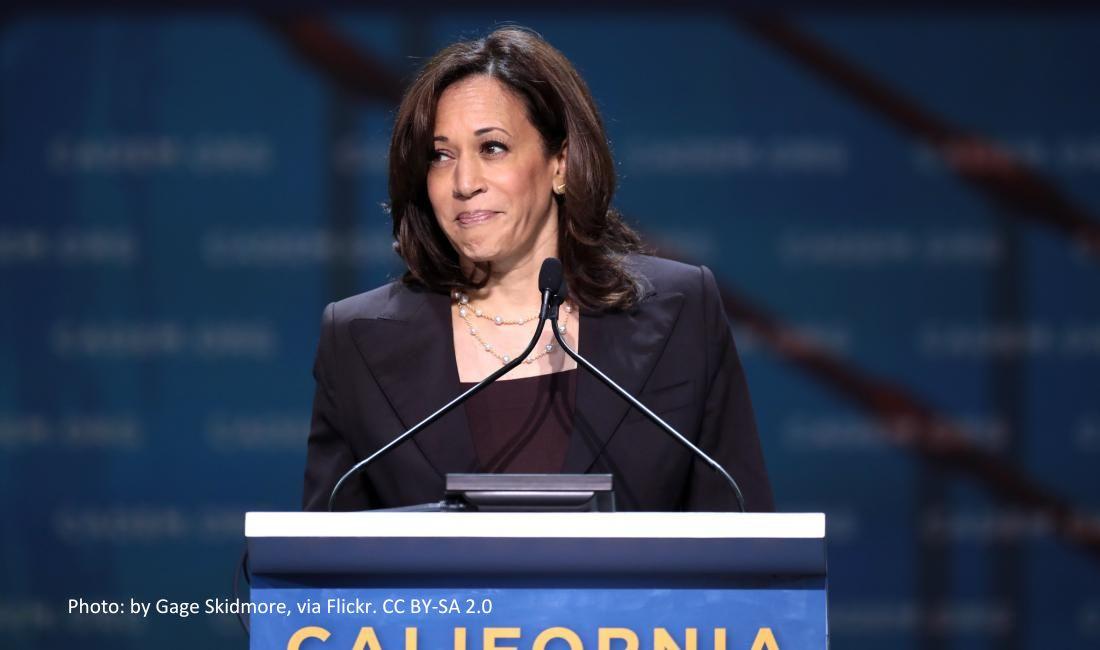California is too exceptional to explain the vice president.
Publicado en El País. Photo: by Gage Skidmore, via Flickr. CC BY-SA 2.0
In 1949, a Los Angeles lawyer and journalist named Carey McWilliams published California: The Great Exception.
The book so expertly details the state’s peculiarities that it has never gone out of print. McWilliams’ enduring explanation for California amounts to this: California is something so strange that it can’t possibly be explained.
“One cannot, as yet, properly place California in the American scheme of things,” McWilliams wrote, in words that ring true today. “To understand this tiger all rules must be laid to one side. All the copybook maxims must be forgotten. California is not another American state. It is a revolution among the state… It is an anomaly, a freak, the great exception.”
California’s essential exceptionalism has made the state a target for Donald Trump and the Republicans as they seek to attack his Californian opponent, Vice President Kamala Harris.
The Democratic nominee for president, the Trumpians argue, is emblematic of a California that is too crazy and progress for the American mainstream. (In a poll, half of Republicans said that California “isn’t really American.”) And Harris, they suggest, is responsible for the state’s high costs and homelessness; “she destroyed California,” Trump says. Harris, the Republican campaign said in a statement, is “California radical who completes the left-wing takeover of Joe Biden.”
But such attacks aren’t working—precisely because California’s exceptionalism is so well-known. The state is so big, so crazy, and so diverse that no one person can be credibly said to embody it. And certainly, no single politician can be blamed for its policies or failures.
The other problem with attacking the exceptional California is that the tactic is too old and familiar.
Indeed, the very first Californian to be a presidential nominee—the Republican John C. Fremont in 1856—drew the same sort of attacks that now face Harris. “We know of no country in which there is so much corruption, villainy, outlawry, intemperance, licentiousness, and every variety of crime, folly and meanness” as California, wrote Hinton R. Helper in a book that became a best-seller that year.
Helper even emphasized San Francisco’s homelessness, just as Trump and the state’s other critics do today. “Degradation, profligacy and vice confront us at every step,” he wrote. “Dozens of penniless vagabonds … are always wandering about the city in idleness and misery. [They] have no other place to rest, no bed except bales of hay into which they creep for shelter and slumber during the long hours of the night.”
Such blasts at the state, and its politicians, have never stopped. McWilliams, of the Great Exception, argued that California simply moved too fast for a plodding America. The state became highly educated before the rest of the country (by 1912, UC Berkeley was the largest university on earth). It became the most populous state in 1962, and has 8 million more people than Texas today. And its economy has never stopped growing, with a GDP matching that of Germany’s.
California has huge problems—a housing shortage, the largest homeless population in the country, and a sky-high cost of living that gives it one of America’s highest poverty rates. Its population growth has plateaued—not because people are leaving (the departure rate is the lowest of all states) but because so few Americans afford to move here.
But it also has done more than other states to address those problems—devoting tens of billions to homeless services, establishing a minimum wage twice the average, and, as of early this year, becoming the first state in the country to provide health care coverage to all its residents, regardless of immigration status.
Californians also live more than two years longer than other Americans. The Bay Area ranks second in life expectancy nationally, and Los Angeles third. That’s a product of a deep state commitment to healthy living—we have some of the country’s lowest rates of smoking, obesity, infant, mortality and suicide. And in a gun-crazy America, California has the strongest gun control laws in the country. If the rest of the country adopted our gun regulations, one study found, the U.S. would save nearly 30,000 lives a year.
“You haven’t lived until you’ve died in California,” quipped the comedian Mort Sahl, who died here in 2021 at age 94.
In this context, we Californians have come to take American criticism as envy in disguise. Arnold Schwarzenegger, when he was governor, liked to respond to California critics by grinning and saying, “Everybody pities the weak. Jealousy, you have to earn.”
Arnold’s confident attitude is justified by California’s present. But when the subject is the state’s future, California faces a fundamental problem for which Harris bears some responsibility.
That problem is the state’s increasingly broken system of governance. For decades, California’s tendency to establish new rights, new regulations and new constitutional amendments, often via voter-approved measures—have made the state too inflexible to govern. The state’s systems—in education, in prisons, in infrastructure—have weakened. The constant emergencies of the state, fueled by climate change, threaten more communities.
The need for systemic change has long been clear. But Harris, during a California career that included stints as San Francisco’s top prosecutor, the state’s top attorney, and as a U.S. Senator from California—dodged these systemic challenges. And she refused to involve herself in political or governance reform movements.
Instead, she did her jobs, carefully and pragmatically, without leaving much of a legacy. There is no signature Harris program or institution in California.
This caution proved to be smart politics. Harris managed to win three very tough elections—a 2006 race for San Francisco district attorney, a 2010 race for state attorney general, and the 2016 contest for U.S. Senate—against better-known opponents. Those victories propelled her rise to the vice presidency.
In the presidential campaign, Harris is fond of telling audiences that she wants to pursue “what can be, unburdened by what has been.” But the Cailfornia she left behind, like the United States she seeks to lead, are severely burdened by the rules of the past, by older systems, by debts.
And there is nothing in her California record, and nothing in the meager policy proposals of her campaign, suggesting that a President Harris has a clear vision for the country, or the will to change our nation’s faltering national systems, or to take on the planet’s biggest problems.
To be sure, Harris’ caution and moderation are serving her well in the campaign, reassuring voters who fear the unpredictable and authoritarian Trump. But if she wins, Americans and people around the world may come to wish that she weren’t so conventional a politician.
The earth’s challenges may require a U.S. president who moves fast, who doesn’t fit convention, who is both as great and as exceptional as California.




